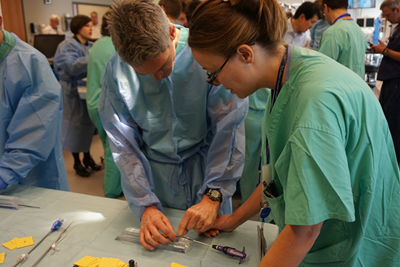Member Resources
Technical support is overseen by a cadre of highly experienced biomedical engineers and faculty, with work typically done by bioengineering students or research staff. This work is supported by substantial technical equipment including polymer and metal 3D printers, advanced microscopes including an Atomic Force Microscope (AFM), dynamic materials testers, 3D bioprinters, a micro-fabrication clean room, diagnostic and test equipment, biosensors, surgical simulation systems, and computational clusters for biomedical simulations.
Medical Technology Innovation
Research Support
A variety of technical and personnel resources are available through the Center to support medical technology innovation, including design, ideation and development, value-creation, prototyping, technical characterization, and manufacturing scale-up.
Many faculty and staff have substantial experience and success with medical device entrepreneurship including new company startups, FDA regulatory processes, intellectual property analysis, market research, M&A, and manufacturing scaleup. The Center works closely with the Medical Device Design and Entrepreneurship training program in the Department of Bioengineering, which trains students on all aspects of value building for medical technologies.
Research Support
Resources are also available to support novel research needs, including fabrication and machining, polymer and metal 3D printing, electronic prototyping and breadboarding, application-specific integrated circuit (ASIC) design, characterization of synthetic and biological materials at a variety of scales, synthesis and functionalization of novel polymer compounds, micro-scale biofabrication, and development of unique diagnostic instruments.
Center faculty have funded research projects to develop a number of innovative technologies including shape memory polymers for minimally invasive medical devices, endoscopic brain imaging, multi-photon optical imaging, nanobubbles to monitor pancreatic function, 4D MRI flow imaging, microbots to disrupt blood clots, on-demand drug delivery, stem cell engineering, optogenetics, artificial hands, socially assistive robotics, wearable technologies, surgical simulators, non-linear ultrasound, nanomaterials, and adaptable functionalization of next-generation polymers.
 The Center has faculty and staff with the skills and resources to undertake design projects including medical devices, training simulators, custom software programs, electronic devices, specialized test equipment and protocols, along with medical imaging processing and diagnostic algorithm development. The Center has specialized software capable of segmenting medical imaging data and performing computer aided engineering studies of human anatomical models.
The Center has faculty and staff with the skills and resources to undertake design projects including medical devices, training simulators, custom software programs, electronic devices, specialized test equipment and protocols, along with medical imaging processing and diagnostic algorithm development. The Center has specialized software capable of segmenting medical imaging data and performing computer aided engineering studies of human anatomical models.
Coupled with the prototyping core, our Center is able to perform complex engineering analysis both in the lab and in silico. Built around the regulated design controls process laid out by the FDA, our design teams are trained in needs assessment, requirement generation, design analysis, verification, validation and generation of data in support of FDA submissions. Having tested multiple devices now cleared by the FDA, the design team is also skilled at designing and executing customized test procedures to help inform the design process. We have experience with designing custom training simulators and educational modules for surgical courses held here on campus and continually improve our engineering design curriculum.
With light machining capabilities and multiple 3D printers, our team is capable of rapidly producing prototypes and customized, anatomical test models. With specialized segmentation software and processing algorithms, we are capable of rapidly generating solid files for additive manufacturing from medical imaging data sets. We are experienced with design for manufacture, molding and casting processes and have a large database of local manufacturers. We are able to provide an interface with contract manufacturers and producing engineering drawings and stereolithography files for service bureaus and external machine shops.